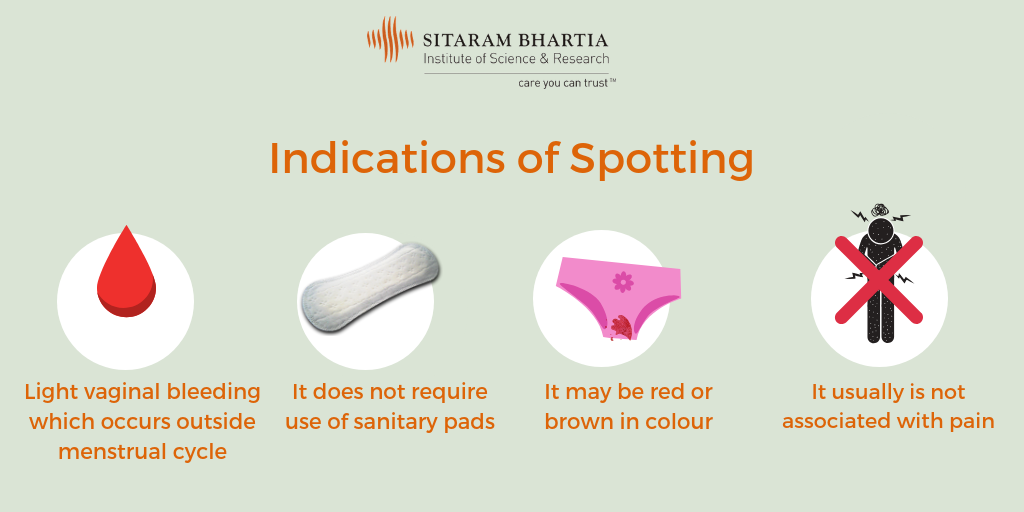Spotting is any light vaginal bleeding that occurs outside your regular menstrual cycle. It usually involves a small amount of blood.
Dr Priti Arora Dhamija, Consultant, Obs-Gyn at Sitaram Bhartia Hospital says, “If you ever experience spotting or any bleeding besides your menstrual cycle, don’t ignore it.”
“It may not always be serious but consult your doctor to rule out any concerns.”
What are signs of spotting?

The following signs can help differentiate between spotting and periods:
- A light vaginal bleeding that falls outside the expected dates of the menstrual cycle
- The bleeding doesn’t require you to wear sanitary pads
- It may be red or brown in colour
- Usually spotting isn’t associated with pain
Two women, Akansha and Sulekha, visited Dr. Priti when they experienced spotting and were unsure of what action to take.
Spotting before period – What should be the course of treatment?
Lately Akansha Dey, 22 has been experiencing discomfort in her vaginal area.
One day she noticed spotting when she came back from work.
Concerned, she called her gynecologist Dr. Priti who asked her to come in for a check-up.
After a detailed history and pelvic examination, Dr. Priti and Akansha discussed the probable causes behind the spotting.
What are the gynecological causes of spotting?
The first step was to rule out a possible pregnancy. Akansha took a pregnancy test which turned out to be negative.
Dr. Priti highlights, “It can be a little difficult to pinpoint the cause behind spotting as it can be anything from hormonal imbalance to abnormal growth in the reproductive system.”
“But with a thorough history, detailed examination and diagnostic tests, the reason can be identified and the right treatment can be advised.”
The various causes of spotting before period could be as follows:
- Contraceptive Pills:
Spotting is a common side effect of emergency contraceptive pills.Dr Priti asked Akansha about her contraceptive use.Dr. Priti says, “If you’ve taken an emergency contraceptive, you may notice spotting”“You may notice spotting in the initial months after you’ve switched to oral contraceptives”“This can be easily managed by altering the dose or brand of the contraceptive pill.”Akansha hadn’t taken any emergency contraceptive pill or changed her contraceptive methods, so this eliminated the possibility of spotting occurring because of pills.
- Vaginal Infections:
Infections like yeast or undetected sexually-transmitted infection (STIs) may also cause spotting.Dr Priti highlights, “If there is an infection, you are likely to experience pain in the lower abdomen, itching or unusual discharge along with spotting.”Upon hearing this, Akansha mentioned the discomfort and irritation in her vaginal area.To confirm whether the spotting and irritation were caused by the infection, Dr Priti suggested a few tests to Akansha.
Akansha was worried and wanted to know other possible causes.
- Abnormal growth in the reproductive tract:
Spotting may also occur when there is an abnormal growth in parts of the uterus or cervix. Conditions like uterine or cervical polyps are benign but may cause unscheduled bleeding.
- Endometriosis:
If you have endometriosis, you may notice spotting before and/or after your menstrual cycle. Some women may even experience it both the times and it is often associated with pain.
Dr Priti adds, “Apart from vaginal infections and contraceptive pills, an unhealthy cervix or cervical erosion may also cause unexplained bleeding.”
Based on Akansha’s test results, it was found out that she had a minor yeast infection.
Treatment options for spotting before period
Dr Priti says, “The treatment of spotting before period depends on the cause behind it.”
Akansha required some medication and care which comprised of practicing proper vaginal hygiene and use of local antibiotics for the infection.
Akansha shares, “I’m so glad that I came in for a consultation. Now that I know it’s a minor infection which can be combated with the prescribed treatment plan – I can rest easy.”
Spotting during pregnancy – what does it mean?
Sulekha Randhawa had recently confirmed her pregnancy.
When she noticed brown discharge, she immediately panicked and booked an appointment with Dr Priti.
Dr Priti explains, “If you notice anything unusual like spotting or brown discharge during pregnancy, seek guidance from your doctor about the cause and the course of action”
Spotting during pregnancy can also occur because of the following reasons –
- Light bleeding in the first trimester -Spotting during first trimester occurs in nearly 27% of pregnancies. However most women have a favourable outcome.Dr Priti reassures, “In early pregnancy, spotting could be an implantation bleeding which is a sign of successful fertilization”“It could also be an indication of a threatened or missed abortion or even ectopic pregnancy in which the pregnancy grows outside the uterus.”“An ultrasound and other tests like gentle pelvic examinations are important to determine the cause behind it.”Based on Dr Priti’s suggestion, Sulekha underwent the pelvic examination and ultrasound to confirm the location and viability of her pregnancy.
Sulekha was relieved when her tests turned out normal and everything was fine with her baby.
She was asked to come in for a follow-up checkup soon to make sure that her pregnancy was progressing normally.
- Spotting during pregnancy second trimester:If spotting occurs during the second trimester of pregnancy, it could be a warning sign for things to come.It could be an indication towards low-lying placenta or a placental abruption.If you have low lying placenta, the first bleed may be a warning sign for a second impending bleeding which would be bigger.Sometimes spotting during pregnancy could be a sign of incompetent cervix wherein, weak cervical tissues results in cervix opening too early and leading to loss of pregnancy.Spotting during pregnancy can also occur because of vaginal infection or cervical polyps. Sometimes there might not be a definite cause for the bleeding.
- Vaginal bleeding in the third trimester:Apart from the above causes, vaginal bleeding in the third trimester may indicate the onset of labour.Dr Priti informs, “Brown discharge during third trimester can herald the onset of preterm labour or normal depending on when it occurs”“Usually there is a tinge of blood in the discharge which may give it a slightly brown colour.”In Sulekha’s follow up checkup, her tests assured that there was no reason to worry. Her pregnancy progressed normally and she is currently in her second trimester.
What should be the treatment for spotting during pregnancy?
Dr Priti says, “If spotting or brown discharge takes place early in pregnancy, we must rule out any adverse outcomes related to pregnancy”
“Based on the cause and trimester, treatment options ranges from conservative to medical or surgical management may be advised”
You may also require regular check-ups.
Conclusion
Dr Priti concludes, “Many times, women ignore spotting or write it off as ‘one-time’ thing”
“It is important to identify the cause behind spotting whether it occurs before your periods or during pregnancy”
“So consult your doctor as timely identification can greatly help you have a positive outcome.”
Do you still have questions regarding your condition? Come in for a consultation with Dr. Priti! Please Chat with us on WhatsApp to schedule a consultation.
This article has been written with inputs from Dr. Priti Arora Dhamija, who has over 16 years of experience as a fertility specialist and obstetrician-gynecologist. She has received training from the Indian Fertility Society in Assisted Reproductive Technologies and fertility enhancing laparoscopy.

Dr. Priti Arora Dhamija, MBBS, Maulana Azad Medical College, Delhi (1999); M.D, Lady Hardinge Medical College (2004); DNB Obstetrics & Gynecology (2004); Diploma in Pelvic Endoscopy, Kiel, Germany (2014)



